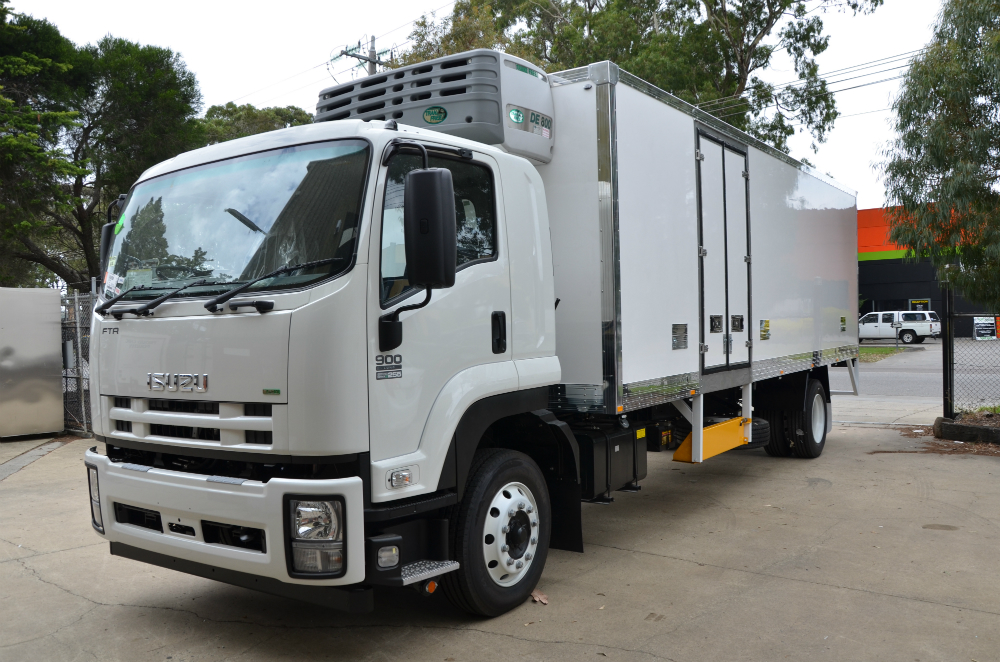Refrigerated trucks, also known as reefer trucks, play a crucial role in the transportation of perishable goods, ensuring that products such as food, pharmaceuticals, and other temperature-sensitive items reach their destination in optimal condition.
These specialised trucks are equipped with a cooling system that maintains a controlled temperature range, typically between 2-8 degrees Celsius (35.6-46.4 degrees Fahrenheit). In this blog post, we will explore the factors that influence the lifespan of a refrigerated truck and how proper maintenance can help extend its longevity.
Types of Refrigerated Trucks
Refrigerated trucks come in various types, each catering to specific transportation needs. The main types include:
- Full-Freezer Van: This type of refrigerated truck is designed to maintain extremely low temperatures, suitable for transporting goods that require deep freezing.
- Semi-Freezer Van: Semi-freezer vans maintain temperatures slightly above freezing, making them ideal for goods that need to stay at a constant cool temperature but not freeze entirely.
- Chiller Conversion Van: These refrigerated trucks maintain temperatures within the chiller range, making them suitable for most perishable goods like fruits, vegetables, dairy products, and pharmaceuticals.
- Insulation Van: These vans are not equipped with cooling systems and instead rely on insulation to maintain the temperature of goods during transport.
Factors Affecting the Lifespan of a Refrigerated Truck
Several factors can impact the longevity and performance of a refrigerated truck:
- Quality of Fuel and Lubricant: Using high-quality fuel and lubricants is essential for the smooth operation of the refrigeration unit. Clean fuel and proper lubrication reduce wear and tear, ensuring the longevity of the engine and refrigeration system.
- Road Conditions: Frequent travel on rough and uneven roads can lead to additional stress on the truck’s components, potentially causing premature wear.
- Operating Environment: Extreme weather conditions, especially in regions with varying seasons, can put additional strain on the refrigeration system. Proper maintenance and suitable insulation are crucial for preserving the goods’ quality.
- Refrigerated Truck Maintenance: Regular maintenance is key to ensuring the truck’s longevity. Simple practices like replacing engine oil, diesel, coolant, and wiper water can contribute to the overall health of the vehicle.
Extending the Lifespan of a Refrigerated Truck
Proper maintenance is vital to extend the life of a refrigerated truck. Here are some essential practices:
- Regular Maintenance Checks: Schedule regular maintenance checks with qualified technicians who specialise in refrigerated trucks. These checks should include inspecting the refrigeration unit, engine, and other vital components.
- Temperature Calibration: Regularly calibrate the temperature settings of the refrigeration unit to ensure it maintains the desired temperature accurately.
- Seal Checks: Regularly inspect and replace damaged door seals. Proper seals prevent temperature leakage and ensure the refrigeration system operates efficiently.
- Addressing Fluid Leaks: Address any fluid leaks immediately to prevent damage to the engine and refrigeration unit.
- Clean Condenser and Air Chute: Keep the condenser and air chute clean from dirt and debris, as this can impact the cooling efficiency.
- Sensor Maintenance: Regularly check and maintain the sensors in the refrigeration unit to ensure accurate temperature readings.
Repair and Replacement of Refrigeration Systems
Despite proper maintenance, refrigeration systems can still encounter issues over time. The good news is that these systems can often be repaired by experienced technicians. Whether it’s fixing a faulty component or addressing a refrigerant leak, prompt repairs can help prolong the truck’s lifespan and ensure it continues to transport goods reliably.
In some cases, if the refrigeration system becomes outdated or severely damaged, a replacement might be necessary. Newer refrigeration units often come with improved efficiency and features that can benefit the transportation process.
Environmental Considerations
While refrigerated trucks are essential for preserving perishable goods during transportation, they do have environmental implications. Conventional diesel-powered transport refrigeration units emit significant amounts of nitrogen oxides (NOx) and particulate matter.
However, advancements in technology have led to the development of more eco-friendly refrigeration systems that produce fewer emissions, helping to mitigate their environmental impact.
Cost Considerations
Refrigerated trucks are significantly more expensive than regular trucks due to the specialised cooling systems and additional features. However, businesses that rely on transporting perishable goods understand the value of investing in a high-quality refrigerated truck to maintain product integrity and customer satisfaction.
Legal and Regulatory Requirements
Operating a refrigerated truck may come with legal and regulatory obligations. In some regions, businesses that use refrigerated trucks are required to have adequate insurance coverage to protect against potential liabilities.
Conclusion
Maintaining a refrigerated truck is essential for ensuring its reliable performance and extended longevity. Regular maintenance, repairs, and replacements are necessary to ensure the vehicle remains in optimum condition.
At Tranzfreeze, we specialise in providing transport solutions for businesses that rely on transporting perishable goods. Our wide selection of refrigerated trucks is designed to meet your specific needs and requirements, all while ensuring the highest quality service and customer satisfaction. Contact us today to learn more about our services.
FAQ Section:
Can a refrigerated truck be used to transport any type of perishable goods?
Yes, refrigerated trucks are designed to transport a wide range of perishable goods, including food, pharmaceuticals, and other temperature-sensitive items.
How often should a refrigerated truck undergo maintenance checks?
Regular maintenance checks are recommended at least once every three months or as per the manufacturer’s guidelines.
Can I repair a refrigeration system if it malfunctions?
Yes, refrigeration systems can often be repaired by experienced technicians, provided the issue is not too severe or outdated.
What steps can I take to reduce the environmental impact of a refrigerated truck?
You can opt for newer, eco-friendly refrigeration systems that produce fewer emissions and ensure proper maintenance to improve efficiency.
Are there any financial incentives or tax benefits for using eco-friendly refrigeration systems?
Depending on your region, there might be financial incentives or tax benefits for using environmentally friendly transportation solutions.


